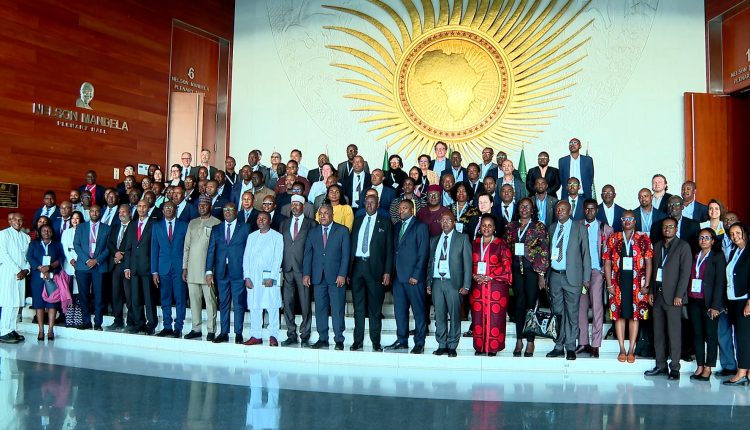Ethiopia sets example for Africa in agriculture by adopting homegrown policy
Addis Ababa, March 6, 2025 (FMC) — Ethiopia’s Minister of Agriculture, Girma Amente, said that the homegrown agricultural and food system policy pursued by Ethiopia is an example for other African countries.
Mr. Girma made this remark at the closing of the Ministerial Meeting of the First High-Level Learning Event on Food Systems Resilience in Eastern and Southern Africa in Addis Ababa.
It is worth noting that the closing of the Ministerial Meeting was held yesterday at the AU headquarters in Addis Ababa. On the occasion, Ministers and high-level representatives of African countries have shared their experiences in the sector, including, food self-sufficiency, food sovereignty and building resilient food system.
The three day event was co-hosted by the Ethiopian government, Intergovernmental Authority on Development (IGAD), Centre for Coordination of Agricultural Research and Development for Southern Africa (CCARDESA), with support from the World Bank. The ministerial meeting had also reflected on the key outcomes of the first High-Learning Event for the Food Systems Resilience Program (FSRP) which was held at Skylight Hotel in the Ethiopian capital on March 4-6, 2025.
In his closing remarks, the Minister shared Ethiopia’s achievements in agriculture and food systems policy to other African nations, highlighting the major initiatives, policies and successes in his country.
He noted that Ethiopia’s homegrown policy approach in the sector adopted to ensure food sovereignty has been successful, which has set an example to other African nations to follow the same path. “Ethiopia is following this path, as the Homegrown Economic Reform (HGER) as a prime example.”
In that regard, the Ethiopian agriculture minister emphasized that Africa needs to develop and implement homegrown policies to advance efforts and build sustainable capacity, underlining that leanings among African countries should be customized and owned nationally by each African nations.
Pointing out that the Food Systems Resilience Programme (FSRP) is fully aligned with Ethiopia’s national priorities and plans, he reiterated the country’s commitment to the programme.
Mr. Girma asserted that his country has made significant strides in improving food security and food sovereignty by mobilizing resources. The Minister said that innovative initiatives in the sector should be designed and implemented, mentioning that Ethiopia’s wheat self-sufficiency as exemplar.
He pointed out that the solution to the problems currently being faced in the sector in Africa and in the world at large is to bring technology to farmers.
Minister Girma pointed out that Ethiopia recently embarked on a digital agriculture roadmap, and and the whole ecosystem from federal to village levels is being digitalized with the aim to digitalize the sector and market in Ethiopia. He asserted that Ethiopia is ready to share its experiences to other African nations in the future.
The Ethiopian agriculture minister further emphasized that improving intra-Africa trade is key to the continent, especially fostering trade connectivity among the continent’s nations.
Cognizant to this matter, 70% of Ethiopia’s export trade comes from agriculture products but the destinations for Ethiopian agricultural products’ is not mainly within Africa, the Minister stated Yet, most of Ethiopia’s coffee export destination is outside of Africa. So the potentials in the continent should be optimized through better infrastructures and strong partnership, according to the Minister.
Godfrey Bahigwa, Director of Agriculture and Rural Development at the African Union Commission, for his part, stressed the importance of exchanging experiences among different African countries.
He said that there are many experiences that need to be shared on the continent, and mentioned that Ethiopia’s wheat self-sufficiency work is one example.
Participants of the ministerial meeting have also commended Ethiopia’s surplus wheat production initiative as a benchmark in Africa which would enable create resilience amid persistent challenges in the world. The delegates said the initiative should be emulated in other parts of Africa to create capacity to respond to potential challenges in the sector.

